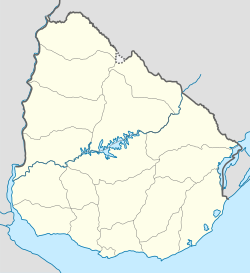Loading AI tools
La Paz is a small city in the Canelones Department, southern Uruguay.
La Paz | |
|---|---|
City & Municipality | |
| Coordinates: 34°45′42″S 56°13′24″W | |
| Country | |
| Department | |
| Founded | 1872 |
| Elevation | 50 m (160 ft) |
| Population (2011 Census) | |
| • Total | 20,524 |
| Time zone | UTC -3 |
| Postal code | 90100 |
| Dial plan | +598 2 (+7 digits) |
La Paz is also the name of the municipality to which the city belongs.
The city is located 2.5 kilometres (1.6 mi) east of Route 5 on the border with Montevideo Department. It belongs to the wider Montevideo Metropolitan Area.
The first Spanish inhabitants settled here in 1758, when the land was distributed to settlers for development. The railroad arrived here in 1868. The village of La Paz was founded on 28 February 1872,[1] its name as a homage to the "Revolution of the Lances" (1870–1872). At the time it was a middle-class resort. The only Jewish cemetery of the country was created here in 1917.
On 15 May 1925, its status was elevated to "Villa" (town) by the Act of Ley Nº 7.837,[1] while on 19 December 1957 it was further elevated to "Ciudad" (city) by the Act of Ley Nº 12.477.[2]
The area was known for its vineyards, wine cellars and agroindustry. There were marble and granite quarries, used for the development of Montevideo and Buenos Aires, in Argentina. These quarries brought many Italian immigrants to the area. The exploitation of granite is still active. The city is also known for its meat industry.[3]
According to the 2011 census, La Paz has a population of 20,524.[4] In 2010, the Intendencia de Canelones had estimated a population of 23,500 for the municipality during the elections.[3]

| Year | Population |
|---|---|
| 1908 | 2,505 |
| 1963 | 13,226 |
| 1975 | 14,653 |
| 1985 | 16,209 |
| 1996 | 19,547 |
| 2004 | 19,832 |
| 2011 | 20,524 |
Source: Instituto Nacional de Estadística de Uruguay[1]
- Nuestra Señora de La Paz, La Paz Church (Roman Catholic)
The city mayor as of July 2010 is Juan Tons.[5]
Wikiwand in your browser!
Seamless Wikipedia browsing. On steroids.
Every time you click a link to Wikipedia, Wiktionary or Wikiquote in your browser's search results, it will show the modern Wikiwand interface.
Wikiwand extension is a five stars, simple, with minimum permission required to keep your browsing private, safe and transparent.
